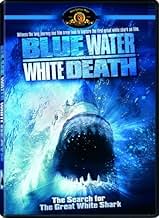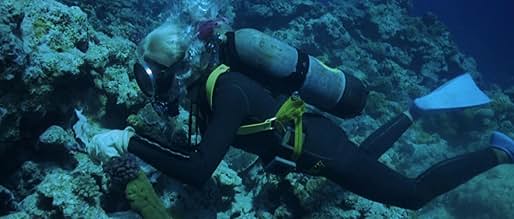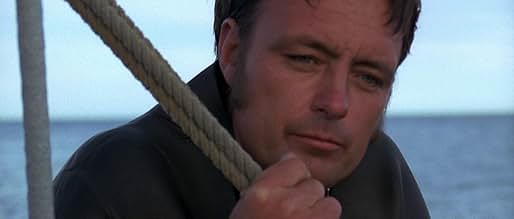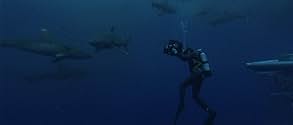Bleue est la mer, blanche est la mort...
Original title: Blue Water, White Death
- 1971
- Tous publics
- 1h 39m
IMDb RATING
7.1/10
483
YOUR RATING
Documentary focusing on great white sharks.Documentary focusing on great white sharks.Documentary focusing on great white sharks.
Stuart Cody
- Self
- (as Stuart R. Cody)
Peter Lake
- Self
- (as Peter A. Lake)
Valerie Taylor
- Self
- (as Valerie May Taylor)
Stan Waterman
- Self
- (as Stanton A. Waterman)
- Directors
- Writer
- All cast & crew
- Production, box office & more at IMDbPro
Featured reviews
10PrncssG
Although I was young when I saw this movie, it has stuck with me all through the years. This is the movie that spawned my interest in sharks! I praise the makers for such a wonderful idea, too bad it got lost in all the Jaws "wake".
It's amazing that when this movie was made, no one has ever filmed a great white before. And it's only been about 40 years since this movie was made.
When I first started taking scuba diving lesson, this movie was all the rage of town. There just wasn't any movie that had shark cage in it before this one. I think this was also the first movie to feature "chumming" technique to lure the sharks. My friends were telling me how huge the sharks were. Later I found out that it wasn't so big, but still it's a really big fish. Did Peter Benchley get his idea from this movie when he wrote "JAWS" ?
This was a ground breaking movie that raised the bar on underwater documentary features. In every underwater documentary there's little bit of influence from this movie. It's also amazing how much more we've learned in such a short time since this movie was made, mostly due to ubiquity of underwater filming.
A very important movie historically in the annals of underwater documentaries.
When I first started taking scuba diving lesson, this movie was all the rage of town. There just wasn't any movie that had shark cage in it before this one. I think this was also the first movie to feature "chumming" technique to lure the sharks. My friends were telling me how huge the sharks were. Later I found out that it wasn't so big, but still it's a really big fish. Did Peter Benchley get his idea from this movie when he wrote "JAWS" ?
This was a ground breaking movie that raised the bar on underwater documentary features. In every underwater documentary there's little bit of influence from this movie. It's also amazing how much more we've learned in such a short time since this movie was made, mostly due to ubiquity of underwater filming.
A very important movie historically in the annals of underwater documentaries.
Besides seeing Blue Water, White Death in a theater in 1971, I first saw a preview of segments of this film some months before its premiere at the first Our World Underwater film festival in Chicago. The preview was narrated live by cameraman Stan Waterman and he took questions after the preview. Everyone in attendance was sitting on the edge of their seats, because no one had ever filmed Great White Sharks before.
In today's world of dozens of documentaries on Great White Sharks and Shark Week on the Discovery Channel, the shark footage can seem a little tame. But the significance of this film shouldn't be minimized. At the time this expedition took place, very little was known about Great White Sharks and most experts of the day thought that getting in the water with a Great White was instant death. This film (with its accompanying book, Blue Meridian), were Peter Benchley's inspirations in writing Jaws.
This excellent film would be a worthy addition to any wildlife documentary aficionado's library, if only it were available on VHS or DVD (I'm just glad I taped it off of TV many years ago). With all the retread junk that's being released on DVDs today, why isn't a great film like this available?
In today's world of dozens of documentaries on Great White Sharks and Shark Week on the Discovery Channel, the shark footage can seem a little tame. But the significance of this film shouldn't be minimized. At the time this expedition took place, very little was known about Great White Sharks and most experts of the day thought that getting in the water with a Great White was instant death. This film (with its accompanying book, Blue Meridian), were Peter Benchley's inspirations in writing Jaws.
This excellent film would be a worthy addition to any wildlife documentary aficionado's library, if only it were available on VHS or DVD (I'm just glad I taped it off of TV many years ago). With all the retread junk that's being released on DVDs today, why isn't a great film like this available?
An interesting film and seafaring adventure of an expedition tracking a great white shark through hundreds of miles of open sea spanning three continents. The search finally bears fruit some 83 minutes into the film which has a leisurely pace throughout and captures the feeding frenzy of white tips on whale carcasses, and barracudas also manage to get screen time for several minutes. Peter Gimbel and his crew are frustrated by their failure to spot a great white but finally get lucky at Dangerous Reef on the south coast of Australia. Here, Gimbel is finally rewarded with great footage of the huge fish. Shark cages are used to film the great white that seems more intent on the cage and the divers inside than the bait dangled before it. An Australian diver relates his run-in with a great white in the ocean, detailing his injuries and his miraculous escape. The footage of the underwater sequences throughout the movie is expertly done.
In 1969 Peter Gimbel set off on the First ever Expedition to Film The Great White Shark. His Team included other World famous underwater Photographers: Stan Waterman, Ron & Valerie Taylor, and also Shark Attack Survivor Rodney Fox.
Their search for the Great White lasted for 9 months and it took them from South Africa to South Australia. A lot of the footage that was Filmed had never been seen before. Some highlights like the dives with the feeding Oceanic Whitetips, and the final encounter with the Great White Shark are simply awesome.
This Documentary is an All Time Classic and is a Tribute To Both the Expedition Team and to the Sharks.
Their search for the Great White lasted for 9 months and it took them from South Africa to South Australia. A lot of the footage that was Filmed had never been seen before. Some highlights like the dives with the feeding Oceanic Whitetips, and the final encounter with the Great White Shark are simply awesome.
This Documentary is an All Time Classic and is a Tribute To Both the Expedition Team and to the Sharks.
Did you know
- TriviaOne of the few documentaries shot in the wide screen 2.35:1 format.
- Quotes
Peter Gimbel: Now I want to tell you very quickly, what we're trying to do off Durban. We're looking for the animal that I think is considered to be the most dangerous predator still living in the world - the Great White Shark - which attacks the carcasses of killed whales in the Indian Ocean on the whaling grounds off here and, in the last ten days has taken five Sperm Whales over forty feet in length and removed from them all the meat down to the spine in a matter of six or seven hours.
- ConnectionsFeatured in Hunt for the Great White Shark (1994)
- SoundtracksCome Along
Written by K. Michael Burke
- How long is Blue Water, White Death?Powered by Alexa
Details
Box office
- Gross US & Canada
- $539,488
- Runtime
- 1h 39m(99 min)
- Sound mix
- Aspect ratio
- 2.35 : 1
Contribute to this page
Suggest an edit or add missing content




















